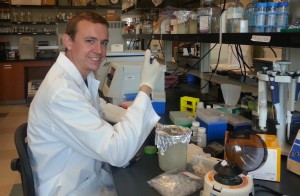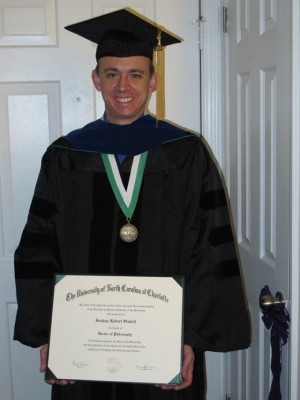Joshua R. Stokell, a UNC Charlotte post-doctoral fellow, died on Monday, June 8 as a result of complications arising from his lifelong battle with Cystic Fibrosis.
Visitation will be Thursday, June 11, from 3 to 7 p.m. at McEwen Derita Chapel, 6300 Mallard Creek Road, Charlotte. The funeral service will follow at 7 p.m.
The Association of Biology Graduate Students at UNC Charlotte is collecting contributions to assist Stokell’s family with his final expenses. Checks can be made payable to ABGS with “Josh Memorial” as the memo and can be mailed to: Department of Biological Sciences, 257, Attention: ABGS, Woodward Hall, UNC Charlotte, Charlotte, NC 28223.
Stokell is survived by his parents Judy Stokell-Bailey and Thomas W. Stokell; his brothers Thomas W. Stokell Jr., Shawn McPheron, and Brian McPheron and his sisters Tracy Garrett and Christy L. Stokell. He also leaves his maternal grandparents, Kendall and Hazel Poole, of Somerset, KY. He is also survived by his girlfriend, Bushra Khan of Charlotte and his many close friends and several aunts, uncles and cousins.
He completed his bachelor’s degree in 2008 and his doctorate in microbiology in 2013 and worked as a post-doctoral fellow with Todd Steck, a biological sciences professor who has been his mentor. Stokell dedicated his studies to CF and was the lead author on a recent article in the Journal of Clinical Microbiology, which describes an unusual, single-patient study and an important finding that may point to an immediate cause of CF exacerbations.
The study found sudden growth of a specific bacterium, Burkholderia multivorans, preceded periods of acute illness. While B. multivorans has been known as a common pathogen in the lungs of CF patients, it is far less abundant than another pathogen, Pseudomonas aeruginosa, whose populations did not show significant changes prior to the life-threatening episodes.
Stokell and his colleagues were able to implicate B. multivorans due to a detailed genomic and metagenomic analysis of a unique, extensive collection of lung sputum samples taken twice-weekly over a three-year period.
Stokell’s co-authors on the paper are Steck and UNC Charlotte bioinformaticians Anthony Fodor, Malcolm Zapata, Raad Gharaibeh and Timothy Hamp.
As Stokell was both a researcher and the study subject in this case, the team gained unparalleled access to the subject’s life history and medical records, providing critical context for the findings. The study represented the most intensive sampling of a single CF patient to date.
Chronic diseases like CF are often daunting puzzles that require an extraordinary amount of research effort to understand — the long-term interaction between the human body’s dynamic systems and the disease can be extremely complex, even when there’s a relatively simple initiating cause, such as a genetic defect. Consequently, researchers studying such diseases need an extra amount of commitment and passion to struggle with the intricate complexities involved.
As a master’s student at UNC Charlotte, Stokell took a class in bioinformatics with Fodor, where students had to come up with projects involving metagenomic analysis of bacterial populations. Stokell recognized that this might be an important research area relevant to his own disease, so he chose lung bacteria in cystic fibrosis, with himself as a research subject. The researchers have received grants from NIH and the Cystic Fibrosis Foundation to continue the research.
Todd Steck’s Memories of Josh Stokell
“I first met Josh as a student in my class in spring of 2008. He would sit next to another student, Wes, about halfway back and to the side. He didn’t get the highest grade in the class, but I had a sense that he would be proficient in the lab, and so towards the end of the semester I asked him if he’d like to do some microbiology research. He seemed surprised by my offer, which didn’t surprise me. Many students don’t realize their potential, and it’s one of the perks of being faculty that you sometimes have the opportunity to allow young adults to see that they have more options than they realized. Josh was one of those students. At the time, I didn’t realize he had Cystic Fibrosis or know about his health struggles that probably contributed to his feeling his options were more limited than most.
 Josh accepted my invitation and began doing research. I soon knew that he would be good, and so I encouraged him to apply to our master’s degree program; he did. As before, he was surprised that I would suggest this. Within a few months he had completed an experiment that a previous student couldn’t do in two years, and was making excellent progress on a microbial source tracking project. Sometimes serendipity plays a role in how science projects are started, and that explains how Josh switched his research to CF. While taking a bioinformatics course with Anthony Fodor, he had to complete a class project. Students could use their thesis research projects as the source of material, but Josh’s project just wasn’t amenable. He and I talked and we decided he would use the bioinformatics tools to see what was going on with the bacteria in his own lungs. He did, and once we saw the interesting results, both Anthony and I thought this could become a thesis project. That became Josh’s new project.
Josh accepted my invitation and began doing research. I soon knew that he would be good, and so I encouraged him to apply to our master’s degree program; he did. As before, he was surprised that I would suggest this. Within a few months he had completed an experiment that a previous student couldn’t do in two years, and was making excellent progress on a microbial source tracking project. Sometimes serendipity plays a role in how science projects are started, and that explains how Josh switched his research to CF. While taking a bioinformatics course with Anthony Fodor, he had to complete a class project. Students could use their thesis research projects as the source of material, but Josh’s project just wasn’t amenable. He and I talked and we decided he would use the bioinformatics tools to see what was going on with the bacteria in his own lungs. He did, and once we saw the interesting results, both Anthony and I thought this could become a thesis project. That became Josh’s new project.
Because Josh was doing so well, he transferred to our Ph.D. program. His dissertation project spanned biology and bioinformatics, and he ended up working closely with Anthony and members of his research team, especially Timm Hamp, who ended up earning his master’s degree in my lab and worked closely with Josh on multiple projects. Josh became trained in both molecular microbiology and bioinformatics. Manuscripts began to be published and honors and awards received. In his early years as a graduate student, Josh received an Outstanding Student Poster Award and Travel Grant recipient for American Society for Microbiology (ASM) Annual Conference. In his last year as a Ph.D. student, he became the Lucille and Edward Giles Dissertation-Year Graduate Fellow.
Once he earned a Ph.D., Josh wanted to continue his work on CF in my lab and received a Duke Energy Post-Doctoral Fellowship to be able to do so. Throughout this time, Josh became an integral part of the lab. Having good people in a lab can make the Principal Investigator’s life easy, and Josh made things easy on me. He was an unofficial Co-PI; he trained new lab members and helped write manuscripts and grants, including a Cystic Fibrosis Foundation Post-Doctoral Fellowship that was funded as well as a recent NIH award. With that NIH award his project was being expanded to include more CF patients, which would have led to many more papers and career opportunities for Josh.
All of these are facts about Josh’s academic career, and while they describe someone who was on track to become a successful academician, they don’t tell you the kind of person Josh was. Unfortunately, my writing skills are too limited to convey how truly special Josh was. What I can tell you is that Josh was easy to like. He was generous with his time, and was a good listener. He didn’t yell, he didn’t complain, he just smiled. It was as if he accepted each day as a gift that he wasn’t going to waste. Josh didn’t demand much of others; he was just grateful for the opportunities he was given. When I first knew him he didn’t have many plans for the future; last week he had a scientific career, a loving partner, and hope for a set of healthy lungs that would allow him to breathe deeply for the first time.
Over the years that I knew Josh, he and I became friends. We supported each other during difficult times. We’d often sit down together and talk; the conversations would start off discussing science, but then move into better topics concerning life. I enjoyed those conversations because Josh and I had shared values and faith, and our personalities meshed; we just liked each other. We also helped each other keep perspective; it’s easy for a job to become too consuming, especially if you’re doing something you love. Being his mentor, I knew Josh wanted to make me proud, and while he knew I was extremely proud of him he may not have known that his concern about obtaining my approval motivated me to be worthy of that respect.
When someone dies, it reminds us of our own mortality, and we look for a life lesson to be learned. For Josh, that lesson is his attitude towards life. We all know that life is precious, but it’s easy for us to take it for granted. Josh lived with a constant reminder of just how fragile life is. So for me, I will think of Josh and remember that life is a gift to be appreciated, respected, and enjoyed.”
Josh Stokell’s Honors, Awards and Publications
Honors/Awards
- Recipient of Outstanding Student Poster Award and Travel Grant recipient for American Society for Microbiology (ASM) Annual Conference 2011 (one of 40 awards given to more than 2800 presented posters).
- Lucille P. and Edward C. Giles Dissertation-Year Graduate Fellow for 2012-2013
- Duke Energy Post-Doctoral Fellow (2013-2014)
- Cystic Fibrosis Foundation Post-Doctoral Fellow (2014-2016)
- Co-I on NIH R15. “Identifying bacterial biomarkers associated with disease progression in cystic fibrosis.” (12/1/2014-11/30/2016)
Publications
- Stokell, J.R., Gharaibeh, R.Z., Hamp, T.J. Zapata, M.J., Fodor, A.A., and Steck, T.R. 2015. Analysis of Changes in Diversity and Abundance of the Microbial Community in a Cystic Fibrosis Patient over a Multiyear Period. J. Clin. Microbiol. 53(1): 237-247. doi: 10.1128/JCM.02555-14.
- Stokell, J.R., Khan, A., and Steck, T.R. 2014. Mechanical Homogenization Increases Bacterial Homogeneity in Sputum. J. Clin. Microbiol. 52(7):2340-2345. doi: 10.1128/JCM.00487-14
- Stokell, J.R., Gharaibeh, R.Z., and Steck, T.R. 2013. Rapid emergence of a ceftazidime-resistant Burkholderia multivorans strain in a Cystic Fibrosis patient. J. Cystic Fibrosis. 12:812-816. doi: 10.1016/j.jcf.2013.01.009.
- Stokell, J., and Steck, T.R. Viable but nonculturable bacteria. Oct 2012. In: Encyclopedia of Life Sciences. John Wiley & Sons, Ltd. Chichester. http://www.els.net [doi: 10.1002/9780470015902.a0000407.pub2]








